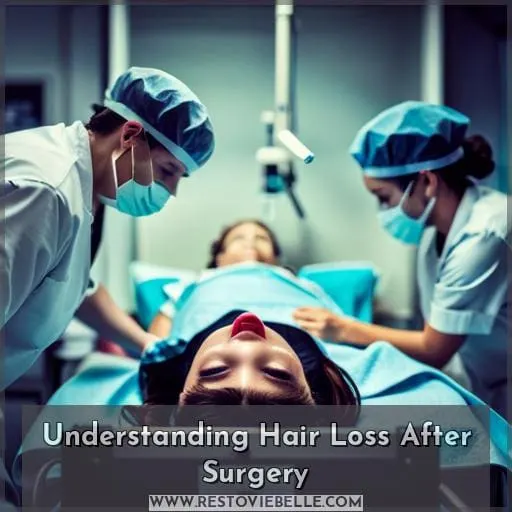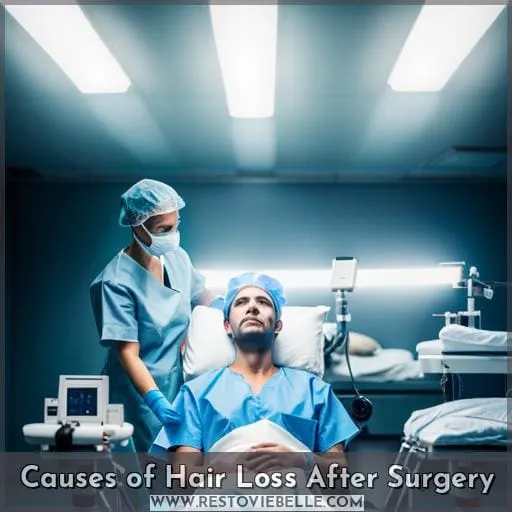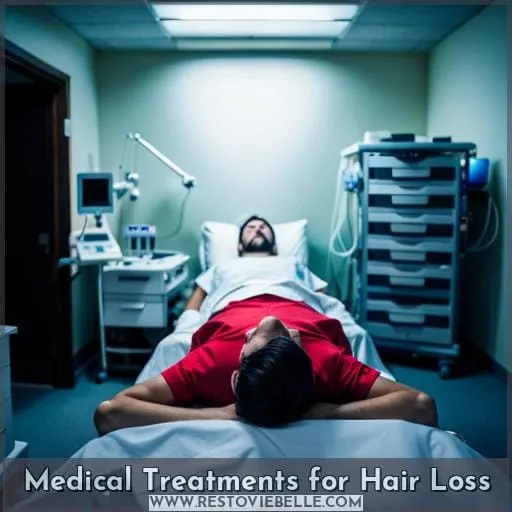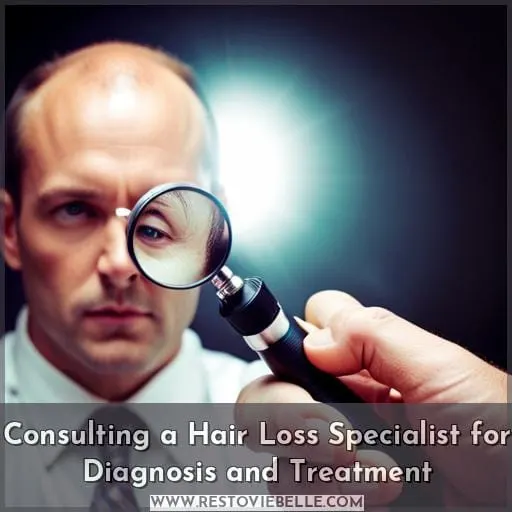This site is supported by our readers. We may earn a commission, at no cost to you, if you purchase through links.
 Surgery can be like walking a tightrope – a delicate balance between risk and reward. But as with any medical procedure, there are potential side effects to consider. One of those is hair loss which may follow anesthesia and surgery due to telogen effluvium (TE).
Surgery can be like walking a tightrope – a delicate balance between risk and reward. But as with any medical procedure, there are potential side effects to consider. One of those is hair loss which may follow anesthesia and surgery due to telogen effluvium (TE).
In this article, we’ll explore the relationship between anesthesia causing hair loss so that you can make an informed decision about your health care options without fear or anxiety in making the right choice for yourself.
We’ll cover common causes of post-surgery hair loss such as stress, medication side effects, positional alopecia, and nutritional deficiencies.
We’ll also discuss preventive measures including stress management techniques, at-home treatments, and medical treatments for restoring lost follicles. Additionally, we’ll provide information on managing hormonal changes to prevent further shedding — all backed up by clinical evidence from leading experts in their field.
If you’re experiencing signs of TE after receiving general anesthetic, let’s dive into understanding how it affects your body starting now!
Table Of Contents
- Key Takeaways
- Understanding Hair Loss After Surgery
- Causes of Hair Loss After Surgery
- Discussing Hair Loss Concerns With Your Doctor
- Preventive Measures for Hair Loss After Surgery
- At-Home Treatments for Hair Loss
- Medical Treatments for Hair Loss
- Understanding Telogen Effluvium
- The Relationship Between Anesthesia and Hair Loss
- Managing Stress and Hormonal Changes to Prevent Hair Loss
- Consulting a Hair Loss Specialist for Diagnosis and Treatment
- Conclusion
Key Takeaways
- Hair loss after surgery can be caused by anesthesia and is known as telogen effluvium (TE).
- Surgery can disrupt the normal hair growth cycle and lead to temporary or permanent changes in hair growth.
- Preventive measures for hair loss after surgery include stress management, gentle hair care practices, and a nutritious diet.
- Anesthesia can contribute to hair loss after surgery, but preventive measures like stress management and a nutritious diet can help minimize the risk.
Understanding Hair Loss After Surgery
Surgery can cause a disruption in your hair follicles’ normal cycle, potentially leading to temporary or permanent changes in the way your hair grows. Anesthesia carries risks of its own and may be linked to post-surgical hair loss, particularly when surgeries last several hours.
Stress from surgery and certain medications taken afterwards could also contribute to thinning or shedding hairs.
For scalp surgeries, positional alopecia due to lying in one position for extended periods of time is possible as well. Successful recovery requires understanding what caused the problem with help from a medical professional; nutritional deficiencies should be addressed if any are found while preventive strategies like stress management and nutritious dieting will minimize risk of further damage during the healing process.
At-home treatments such as minoxidil or microneedling might assist regrowth while more invasive options like corticosteroid injections and laser therapy require consultation with a dermatologist before attempting them on your own at home.
Hair loss after surgery usually resolves itself over time but the psychological impact can still linger, so it’s important to take immediate action to address the underlying issues causing it whenever possible for the best results.
Causes of Hair Loss After Surgery
Hair loss after surgery is a common occurrence caused by stress, positional alopecia, anesthesia, medication side effects, the type of surgery, and nutritional deficiencies. It’s important to discuss any concerns you may have about hair loss prior to undergoing surgery so that preventive strategies like a nutritious diet and stress management can be employed to help minimize the risk.
Stress
Managing stress levels is essential to help prevent and treat post-surgery hair loss, with up to 80% of telogen effluvium cases being caused by some form of emotional or physical stress. Causes include hormonal changes, psychological distress, and decreased blood flow due to the anesthesia period.
Stress management techniques, such as deep breathing, spending time with loved ones, and practicing mindfulness, can help reduce the impact. Coping strategies like exercise may also be beneficial in reducing the psychological burden from the surgery experience.
Finally, a nutritious diet that supplies adequate protein intake and micronutrients like iron, selenium, and zinc can support healthy hair follicles for optimal growth rate after surgery.
Positional Alopecia
Being in one position for several hours during surgery can lead to positional alopecia, a type of hair loss. Preventing it requires being mindful of scalp pressure and taking preventive measures like changing sleeping positions or using a pillow with less height.
Treatment options include hormone therapy or medical treatments. Hair loss due to anesthesia is usually temporary but should be monitored closely as other factors may affect the growth rate. Positional alopecia prevention tips involve avoiding tight hairstyles and wearing supportive headgear while asleep, if necessary.
Anesthesia
Anesthesia can inhibit stress during surgery, potentially avoiding telogen effluvium. Hair loss prevention strategies like a nutritious diet and stress management may help minimize hair loss. Anesthesia risks include general anesthesia or hypotensive anesthesia-induced shock and organ damage.
Combating hair loss through managing emotional stress, exercising regularly, getting enough sleep, and maintaining a healthy diet lowers the risk of post-surgery TE. Consult a healthcare provider for personalized advice to regulate the hair growth cycle after surgery.
Medication Side Effects
Some medications taken post-surgery can cause devastating side effects like hair loss, leaving you feeling helpless. Medication interactions and certain anesthesia risks could be to blame for thinning or balding patches.
Alternative treatments like microneedling may help regrow your hair, while maintaining healthy habits support overall hair health. To prevent medication side effects from causing additional distress, discuss potential causes with a doctor before surgery and weigh all options carefully.
Type of Surgery
Different types of surgery can trigger different reactions, so it’s important to research potential consequences beforehand. The recovery process and post-surgery care are key for hair regrowth. Hair follicles may be affected by the type of surgical procedure or anesthesia used during the operation.
Hair cycle disruption is a common result of certain surgical techniques, leading to temporary hair loss. To minimize risks associated with the surgery, consider all factors such as the type of anesthesia and a proper post-surgery care plan before proceeding with any surgical procedure related to your hair loss concerns.
Nutritional Deficiencies
Nutritional deficiencies, such as low iron and zinc levels, may play a role in post-surgery hair loss. Preventive strategies like adequate protein and micronutrient intake can help regulate the hair growth cycle.
Iron supplementation can be beneficial for those with deficiencies to support healthy hair follicles.
Discussing Hair Loss Concerns With Your Doctor
When it comes to post-surgery hair loss, discussing your concerns with a doctor is essential. Understanding the causes and potential treatments of hair loss can help you make an informed decision before undergoing surgery.
Hair follicles have their own growth cycle that may be disrupted by surgical trauma or stress from anesthesia, leading to telogen effluvium—a sudden shedding of hairs in large amounts after surgery. Consulting a dermatologist for advice on how to regulate the hair growth cycle may provide relief from symptoms like thinning patches all over the scalp in severe cases of TE.
At-home treatments such as minoxidil (gaine) topical treatment might also be recommended by healthcare providers, while professional therapies like laser therapy and corticosteroid injections could offer more long-lasting results if needed.
It’s important to remember that although certain medications taken post-surgery may lead to temporary hair loss, this usually resolves itself over time without medical intervention or lifestyle changes being necessary.
However, consulting a dermatologist for personalized advice is vital when considering any type of medical therapy for managing telogen effluvium caused by anesthesia following surgery procedures.
Preventive Measures for Hair Loss After Surgery
It is important to take preventive measures when it comes to hair loss after surgery, such as managing stress levels, maintaining a gentle hair care routine, and eating a nutritious diet. Stress management techniques like deep breathing and mindfulness can help protect against telogen effluvium caused by anesthesia or physical trauma during surgery.
Stress Management
Managing stress levels through relaxation techniques, coping strategies, and emotional well-being can reduce the risk of post-surgery hair loss. Stress management is key; deep breathing exercises, connecting with loved ones, and practicing mindfulness can aid in reducing anxiety.
Lifestyle changes such as exercising regularly or getting enough sleep may also help minimize symptoms of telogen effluvium caused by anesthesia. In some cases, hormone therapy or medical treatments may be necessary for lasting relief from hair loss after surgery.
Gentle Hair Care Practices
Caring for your hair gently after surgery can help minimize any potential hair loss. Prevent breakage with scalp massage, protective styling, and avoiding heat stylers. Hair masks and other treatments may support the growth cycle of thinning strands.
Nutritious Diet
Fueling your body with a nutritious diet full of essential vitamins and minerals can help promote healthy hair growth post-surgery and beyond. Iron deficiency, for example, has been linked to hair loss, so it’s important to include iron-rich foods in your meals.
Selenium supplements are also beneficial as they have antioxidant properties, which may prevent oxidative stress from damaging the scalp. Eating zinc-rich foods such as oysters or spinach can support healthy follicles, while increasing protein intake is key for strong strands.
Certain hair growth vitamins like biotin and vitamin C should be taken regularly too if advised by a hair loss expert.
At-Home Treatments for Hair Loss
Dealing with hair loss after surgery? Try at-home treatments like minoxidil and microneedling. Minoxidil is a topical treatment that can stimulate hair regrowth, although its effectiveness for telogen effluvium hasn’t been scientifically proven.
Microneedling is another potential solution. It utilizes tiny needles to create micro channels in the scalp, encouraging cell division and increased blood flow.
Additionally, taking certain supplements such as biotin or other vitamins known to support healthy follicle growth may be beneficial. Regularly performing a scalp massage using gentle techniques can also help encourage circulation while providing relaxation benefits.
Lastly, avoid pulling on your strands too much or brushing through them roughly. This could cause further damage, leading to more extensive shedding of handfuls of hairs over time.
As always, consult your doctor before trying any new home remedies due to possible risks, including infection.
Medical Treatments for Hair Loss
If you’ve experienced hair loss after surgery or anesthesia, it may be caused by telogen effluvium. There are medical treatments available to help with hair restoration and reduce the effects of this condition.
For those looking for professional help, consider platelet therapy, a non-surgical approach that can promote natural hair growth. Hair transplants involve surgically moving healthy follicles from one area of the scalp to another to replace thinning areas or baldness patches.
Laser treatment is a low-risk procedure that uses light energy delivered through lasers on your scalp. This stimulates new cell production in dormant follicles, improving circulation and promoting thicker, healthier hair growth over time.
Topical solutions, such as minoxidil, have been proven effective at treating alopecia. However, they should always be used under doctor supervision due to potential side effects like skin irritation and itching sensations.
For more advanced cases seeking long-term results, there are also several surgical options available. Follicular Unit Extraction (FUE) involves extracting individual hairs directly from donor sites and implanting them into recipient sites, creating natural-looking coverage.
Scalp micro pigmentation (SMP) involves injecting pigment into tiny incisions made around the head, resulting in an illusion of shaved stubble. Flap Surgery is another option, where large sections of skin containing live growing hairs are moved from the back/side onto the front/top part.
Stitches hold them in place while allowing the blood supply to continue supplying the nutrients needed for successful transplantation recovery.
Finally, Micrografting involves harvesting small grafts containing 1-2 hairs each and transferring them to the desired location using stereo microscopes and precision accuracy technology.
To learn more about these treatments, contact Chicago Hair Institute today for expert diagnosis and guidance when considering the most suitable option for your individual needs and goals!
Understanding Telogen Effluvium
Understanding telogen effluvium is key to managing hair loss related to anesthesia and other factors. Telogen effluvium (TE) is a condition where the person suddenly sheds more hair than usual over a period of weeks or months, sometimes with thinning patches appearing all over the scalp in severe cases.
Diagnosing TE may be difficult as identifying its exact cause can often prove tricky; timely diagnosis, however, is important for peace of mind when dealing with sudden hair loss. Stress reduction techniques are essential in managing cases of TE caused by high emotional stress levels – lowering them will help resolve it faster and prevent further damage from occurring.
Anesthesia might not directly cause telogen effluvium as it inhibits stress during surgeries; but if you’d like advice on how best to manage your risk before an operation involving general anesthesia, contact Dr.
The Relationship Between Anesthesia and Hair Loss
Navigating the relationship between anesthesia and hair loss can be tricky, but with timely diagnosis and effective strategies, you can manage this condition. Anesthesia risks must be taken into account when undergoing surgical procedures as it may cause temporary or even permanent hair loss due to its effects on the delicate scalp tissue.
Recovery tips such as stress reduction, proper nutrition, gentle handling of hair follicles during surgery, and other means of minimizing damage are essential for protecting your locks from harm.
Additionally, understanding how anesthesia affects the normal hair growth cycle will help those who have undergone a procedure make informed decisions about their care plan afterwards.
Finally, recognizing that certain medications used in combination with anesthetic agents or those prescribed post-surgery may increase sensitivity of individuals’ scalp is also key to preventing potential issues associated with telogen effluvium (TE) related to anesthesia use.
Key Takeaways:
- Understand Anesthesia Risks
- Follow Post Surgery Recovery Tips
- Recognize Hair Follicle Sensitivity
Managing Stress and Hormonal Changes to Prevent Hair Loss
Managing stress levels and hormonal imbalances can help you take control of your hair loss journey. Stress hormones like cortisol can lead to increased shedding, while an imbalance in other hormones may affect the growth cycle of your hair follicles.
Coping with stress through deep breathing, talking to a loved one or professional, and practicing mindfulness are all effective ways to manage anxiety related to surgery.
Additionally, balancing hormone levels by taking supplements or medications prescribed by a doctor may also be helpful for preventing hair loss after surgery.
Hormonal Changes:
- Balance hormone levels
- Take supplements or medications
Coping with Stress:
- Deep breathing
- Talking to a loved one
- Practice mindfulness
- Seek professional help
- Manage anxiety
- Take supplements
Consulting a Hair Loss Specialist for Diagnosis and Treatment
If you’re experiencing unexplained hair loss after surgery, it’s important to consult a specialist for an evaluation. A hair loss expert can accurately diagnose the cause of your hair loss and provide tailored treatment options that best suit your needs.
For example, if telogen effluvium is determined as the cause of your post-surgery hair thinning or bald patches, they may recommend specific lifestyle changes such as reducing stress levels and managing hormone changes to encourage regrowth.
Additionally, they may suggest at-home treatments like minoxidil or microneedling, as well as professional treatments such as corticosteroid injections or laser therapy.
Your specialist will also be able to assess any potential underlying medical conditions that could be contributing factors. This comprehensive understanding will help you find effective solutions together for long-term results.
With their expertise and support throughout the diagnosis stages and treatment options selection based on individual assessment results, you’ll have access to every available option customized just for you.
Conclusion
It’s no secret that surgery can be a stressful experience, and it’s no surprise that hair loss is one of the many possible side effects. But can anesthesia cause hair loss? The answer is yes. Anesthesia can be a trigger for telogen effluvium, a condition that causes hair follicles to enter a resting phase and shed excessively.
While this type of hair loss is usually temporary, it’s still important to discuss any concerns you may have about hair loss with your doctor before surgery. Taking preventive measures like managing your stress levels, eating a nutritious diet, and using gentle hair care products can help minimize your risk of hair loss after surgery.
If you’re experiencing hair loss, you may want to consider at-home treatments like minoxidil or professional treatments like corticosteroid injections and laser therapy. When it comes to hair loss after surgery, the key is to manage the physical and emotional stress and to consult a specialist for personalized advice and treatment options.
















